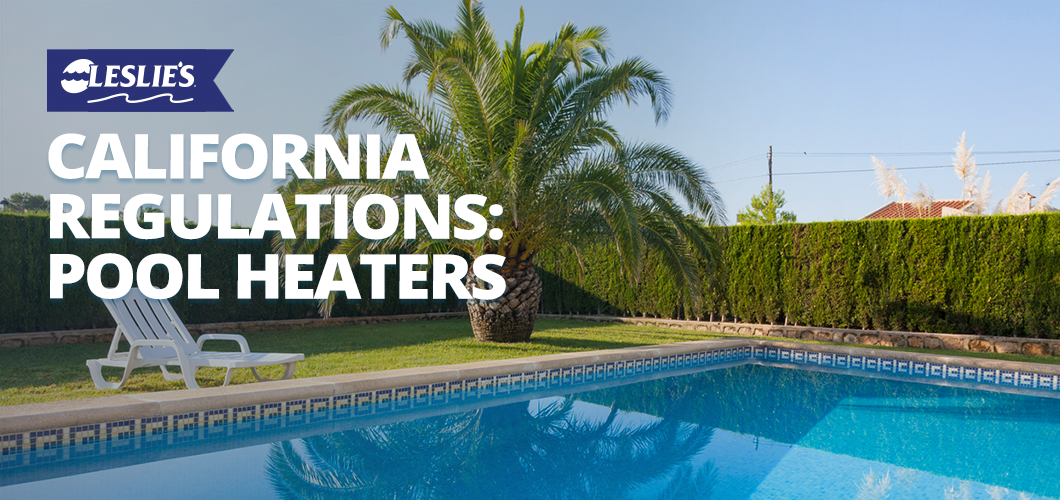
California Regulations: Pool Heaters
What does the California Code of Regulations say about pool heaters?
Efficiency requirements for pool and spa heaters are outlined in Title 20 (Public Utilities and Energy) and Title 24 (Building Standards Code). Pool heaters and heat pumps purchased and/or installed in the state of California must meet the following basic performance and installation standards:
- Continuous pilot lights (millivolt ignition) are not permitted.
- Thermal efficiency ratings must comply with the California Appliance Efficiency Regulations.
- Heaters must have a readily accessible ON/OFF switch to turn the heater off without adjusting the thermostat.
- Pool and spa heaters must have a permanent, weatherproof plate or card with operating instructions.
- Extra pipe or connections must be installed to allow for the future addition of a solar pool heater.
- Outdoor pools and spas using a heating system must also use a pool cover to help conserve energy.
- Swimming pools must use directional inlets (to adequately mix the water) and time switches or a similar control mechanism (to keep energy savings at a maximum).
Electric resistance heaters are restricted in California, but there are a couple exceptions that allow for their installation. Electric resistance heating is not permitted, except for:
- Listed package units with fully insulated enclosures (such as a hot tub) and with tight-fitting covers, insulated to at least R-6.
- Pools or spas getting 60% or more of their annual heating from site solar energy or recovered energy.
Are there regulations for pool heater emissions?
Actually, yes. Much of Southern California and the San Joaquin Valley require pool heaters to meet low nitrogen oxide (NOx) emission standards. The South Coast Air Quality Management District (SCAQMD) and San Joaquin Air Pollution Control District (SJAPCD) are responsible for ensuring air quality standards meet or exceed state and federal regulations, and they actively enforce these emission requirements.
“Low NOx” gas pool heaters are designed to emit very low levels of nitrogen oxide, which allows them to meet the strict air quality laws in these areas. Since heat pumps don’t use combustion to produce heat, they are not affected by these regulations. For this reason, heat pumps and low NOx pool heaters are both popular choices for pool owners in these areas - particularly Southern California.
Is my pool heater compliant?
If you’re unsure whether or not your gas heater or heat pump meets the minimum thermal efficiency requirements of the California Code of Regulations, check out the California Appliance Efficiency Database. There are more than 700 models of gas/oil pool heaters and electric heat pumps approved for purchase and installation in California.
As for compliance with air quality standards, check your local emissions law to determine if you’ll need a low- or no-emission heater for your pool. A list of approved low NOx heaters can be found on the SCAQMD website.
If your current pool heater is NOT compliant with state and local laws, you don’t need to replace it right away. Current residential codes for pool heaters apply to new installs and replacement heaters, not existing heaters currently in use. However, once your old heater fails, you’ll need to replace it with a new, more efficient model that meets these strict standards.
Where can I find a pool heater that meets California’s energy and emission standards?
Leslie’s carries a broad selection of low NOx pool heaters and heat pumps that meet or exceed current energy and emission standards in California.
Additional counties and air districts in California are gradually adopting new policies, requiring that pool heaters be both energy efficient AND environmentally friendly. To stay ahead of the curve, pool owners in currently unaffected counties are already upgrading their existing heater with a low NOx pool heater or a pool heat pump. Not only will these two types of heaters comply with future emission and efficiency laws, but they can also save pool owners quite a bit in annual heating expenses.
Where can I find verbiage about pool heater regulations in California?
Title 24, Part 6, Subchapter 2, Section 110.4
Title 24, Part 6, Subchapter 2, Section 110.5
Title 20, Division 2, Chapter 4, Article 4, Section 1604(g)
Title 20, Division 2, Chapter 4, Article 4, Section 1605.3(g)
Title 20, Division 2, Chapter 4, Article 4, Section 1605.1(g)